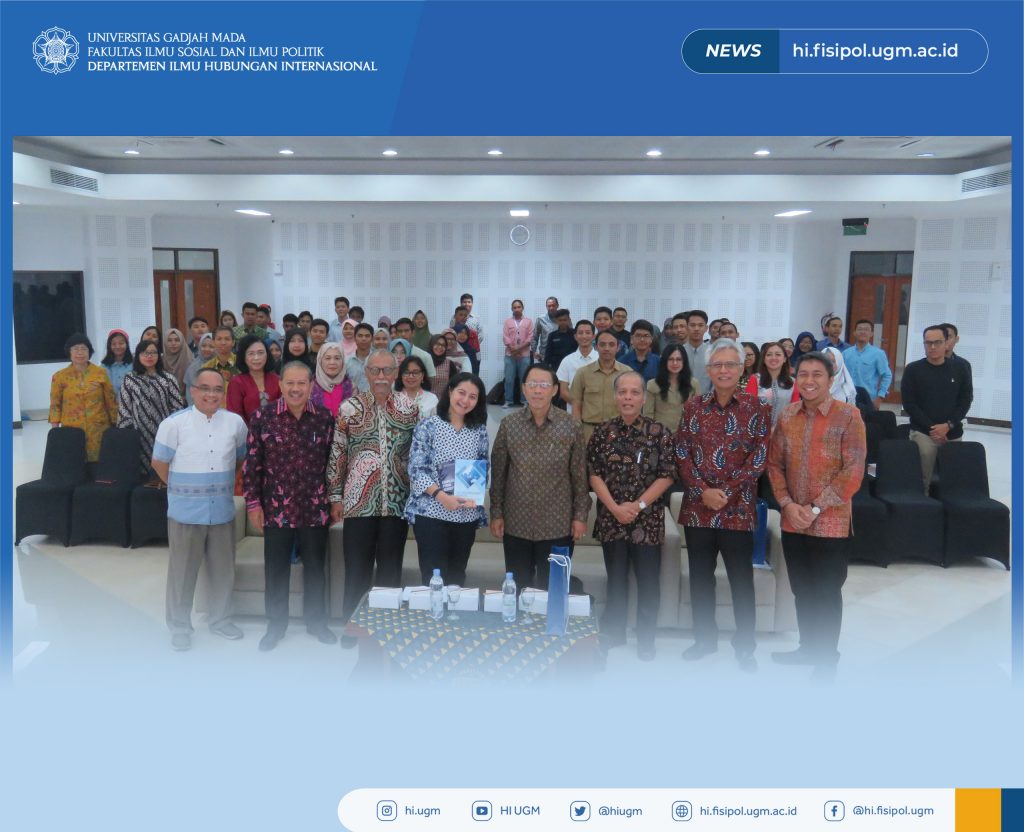Policy Analysis and Development Agency (BPPK), Ministry of Foreign Affairs of The Republic of Indonesia in collaboration with the Department of International Relations, Faculty of Social and Political Sciences, Universitas Gadjah Mada organized ‘Forum Debriefing V’ of the Republic of Indonesia’s Head Representatives in Auditorium Mandiri, FISIPOL UGM (26/8).
In his remarks, the Secretary of BPPK, Eko Hartono, stated that the Forum Debriefing is a routine activity from the Ministry of Foreign Affairs and serves as a form of public accountability for the Head of Representatives regarding the achievements made during their assignment abroad.
This forum presented H.E. Harry Purwanto, SH, Ambassador of Republic of Indonesia to the Federal Republic of Nigeria concurrently Benin, Burkina Faso, Gabon, Ghana, Cameroon, Congo, Liberia, Niger, Sao Tome and Principe, Togo, and ECOWAS (2015-2018); H.E. Drs. Dominicus Supratikto; Ambassador of Republic of Indonesia to the Republic of Suriname and the Republic of Guyana (2015-2018) and H.E. Drs. Djoko Harjanto, Ambassador of Republic of Indonesia to the Syrian Arab Republic (2015-2018). The program was hosted by Dr. Randy Wirasta Nandyatama and Prof. Dr. Mohtar Mas’oed as the discussant.
On this occasion, H.E. Ambassador Harry Purwanto said that the visions and missions of the Ambassadors, in general, are to build and strengthen a good bilateral relationship; promoting Indonesia; making observations to find opportunities; facilitate Government-to-Government, Business-to-Business, and People-to-People interactions; and improve the quality and protection of Indonesian citizens and Indonesian Legal Entities.
H.E. Ambassador Harry Purwanto also elaborated that in Nigeria, tribalism is the reason why there is a lot of conflict in the country as tribes are fighting for their interests. However, over time, the conflict gradually began to diminish and Nigeria became a more democratic country. Nigeria is also a member of the Economic Cooperation of West Africa States which encourages economic integration in West Africa, and the Central African Economic and Monetary Community which aims to achieve collective autonomy to improve the living standards of the population and maintain economic stability.
H.E. Drs. Dominicus Supratikto, as the Indonesian Ambassador to the Republic of Suriname and the Republic of Guyana, explained that initially, Suriname did not consider Indonesia as a strategic partner which resulted in the Suriname Ambassador’s post to Indonesia was vacant for more than a year. To improve this relationship, Indonesia began to focus on developing relations in economic and tourism.
For Guyana, the Government of Indonesia focussed on political diplomacy by developing the best possible network. H.E. Dominicus Supratikto also stated that Indonesia is not an Islamic state, but a multi-ethnic country and there is no absolute domination from the central government over its regions.
During his presentation, H.E. Drs. Djoko Harjanto, former Indonesian Ambassador to the Syrian Arab Republic stated that Indonesia-Syria relations had been established since early Indonesia’s independence period and Syria was one of the first foreign countries to send disaster aid when Indonesia experienced a Tsunami.
Many countries do not open their representative offices in Syria since it is still in a state of conflict. But Indonesia continues to open a representative office in Syria, the Indonesian Embassy in Damascus, to carry out its functions for Indonesian citizens who are still in Syria. There are various challenges for the Indonesian Embassy in Damascus in the protection of Indonesian citizens. Among them are the unconducive security situation in Syria, complicated bureaucracy and court procedures, and the lack of cooperation between the Syrian Government in the moratorium policy on sending Indonesian migrant workers (TKI) to the Middle East and obstacles in tracking TKI’s identities. Because of this situation, the Indonesian Embassy in Damascus has repatriated 11.989 Indonesian citizens in 264 repatriation waves during the 2012-2015 period.
At the end of the event, Prof. Dr. Mohtar Mas’oed said that a diplomat needs the ability to influence others without resorting to violence, and the art of negotiation cannot be learned just by reading the text, it must be learning by doing. The session ended with the Secretary of the BPPK, Eko Hartono, giving a presentation on the entry selection procedures and employment prospects at the Ministry of Foreign Affairs.
Writer: Leon Apriellio
Editor: Arlitadian Pratama dan Novi Dwi Asrianti
Translator: Melisa Rachmania

